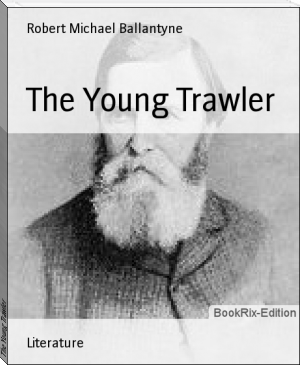The Young Trawler - Robert Michael Ballantyne (large screen ebook reader txt) 📗

- Author: Robert Michael Ballantyne
Book online «The Young Trawler - Robert Michael Ballantyne (large screen ebook reader txt) 📗». Author Robert Michael Ballantyne
The jovial Zulu bestowed on the company a broad and genial grin as he set the example by filling a bowl with the soup. The others did not require a second bidding. What they lacked in quality was more than made up in quantity, and rendered delicious by appetite.
Conversation flagged, of course, while these hardy sons of toil were busy with their teeth, balancing themselves and their cups and bowls carefully, while the little vessel rolled heavily over the heaving waves. By degrees the teeth became less active and the tongues began to wag.
"I wish that feller would knock off psalm-singin'," said Gunter with an oath, as he laid down his knife and wiped his mouth.
He referred to Luke Trevor, who possessed a sweet mellow voice, and was cheering himself, as he stood at the helm, by humming a hymn, or something like one, for the words were not distinguishable in the cabin.
"I think that Luke, if he was here, would wish some other feller to knock off cursin' an' swearin'," said Joe.
"Come, Joe," said the skipper, "don't you pretend to be one o' the religious sort, for you know you're not."
"That's true," returned Joe, "and I don't pretend to be; but surely a man may object to cursin' without bein' religious. I've heard men say that they don't mean nothin' by their swearin'. P'raps the psalm-singin' men might say the same; but for my part if they both mean nothin' by it, I'd rather be blessed than cursed by my mates any day."
"The admiral's signallin', sir," sung out Luke, putting his head down the companion at that moment.
The men went on deck instantly; nevertheless each found time to light the inevitable pipe before devoting himself entirely to duty.
The signal was to haul up the trawl, and accordingly all the fleet set to work at their capstans, the nets having by that time been down about three or four hours.
It was hard work and slow, that heaving at the capstans hour after hour, with the turbulent sea tossing about the little smacks, few of which were much above seventy tons burden. One or two in the fleet worked their capstans by steam-power--an immense relief to the men, besides a saving of time.
"It's hard on the wrists," said Gunter during a brief pause in the labour, as he turned up the cuffs of his oiled frock and displayed a pair of wrists that might well have caused him to growl. The constant chafing of the hard cuffs had produced painful sores and swellings, which were further irritated by salt water.
"My blessin's on de sweet ladies what takes so much trouble for us," said Zulu, pulling up his sleeves and regarding with much satisfaction a pair of worsted cuffs; "nebber had no sore wrists since I put on dese. W'y you no use him, Gunter?"
"'Cause I've lost 'em, you black baboon," was Gunter's polite reply.
"Nebber mind, you long-nosed white gorilla," was Zulu's civil rejoinder, "you kin git another pair when nixt we goes aboard de mission-ship. Till den you kin grin an enjoy you'self."
"Heave away, lads," said the skipper, and away went the capstan again as the men grasped the handles and bent their strong backs, sometimes heaving in a few turns of the great rope with a run, as the trawl probably passed over a smooth bit of sand; sometimes drawing it in with difficulty, inch by inch, as the net was drawn over some rough or rocky place, and occasionally coming for a time to a dead lock, when--as is not unfrequently the case--they caught hold of a bit of old wreck, or, worse still, were caught by the fluke of a lost anchor.
Thus painfully but steadily they toiled, until the bridle or rope next to the beam appeared above the waves, and then they knew that the end of all their labour was at hand.
CHAPTER SEVEN.
A HAUL AND ITS CONSEQUENCES--MYSTERIOUS NEWS FROM THE LAND.
"Now Billy, you shrimp," cried David Bright, seizing his son by the collar and giving him a friendly shake that would have been thought severe handling by any but a fisher-boy, "don't go excitin' of yourself. You'll never make a man worth speakin' of if you can't keep down your feelin's."
But Billy could not keep down his feelings. They were too strong for him. He was naturally of an excitable--what we may call a jovial-- jumping--disposition, and, although he had now been some months at sea, he had not yet succeeded in crushing down that burst of delight with which he viewed the cod-end of the great deep-sea net as it was hoisted over the side by the power of block and tackle.
"You never trouble yourself about my feelin's, father, so long's I do my dooty," said the boy with native insolence, as he looked eagerly over the side at the mass of fish which gleamed faintly white as it neared the surface, while he helped with all his little might to draw in the net.
"But I want to teach you more than dooty, my boy," returned the skipper. "I've got to make a man of you. I promised that to your mother, you know. If you want to be a man, you must foller my example--be cool an' steady."
"If I'm to foller your example, father, why don't you let me foller it all round, an' smoke an' drink as well?"
"Shut up, you agrawatin' sinner," growled the skipper. "Heave away, lads. Here, hand me the rope, an' send aft the tackle."
By this time the heavy beam had been secured to the side of the vessel, most of the net hauled in, and the bag, or cod-end, was above the surface filled almost to bursting with upwards of a ton of turbots, soles, haddocks, plaice, dabs, whitings, etcetera, besides several hundredweight of mud, weeds, stones, and oysters. Sometimes, indeed, this bag does burst, and in one moment all the profit and toil of a night's fishing is lost.
When the skipper had secured a strong rope round the bag and hooked it on to a block and tackle made fast to the rigging, the order was given to heave away, and gradually the ponderous mass rose like an oval balloon, or buoy, over the vessel's side. When it cleared the rail it was swung inwards and secured in a hanging position, with the lower end sweeping the deck as the smack rolled from side to side. In all these operations, from the prolonged heaving at the capstan to the hauling in of the net, hand over hand, the men were exerting their great physical powers to the uttermost--almost without a moment's relaxation--besides being deluged at times by spray, which, however, their oiled frocks, long boots, and sou'-westers prevented from quite drenching them. But now all danger of loss was over, and they proceeded to liberate the fish.
The cod-end had its lower part secured by a strong rope. All that had to be done, therefore, was to untie the rope and open the bottom of the net.
It fell to Luke Trevor to do this. Billy was standing by in eager expectation. Ned Spivin stood behind him. Now, we have said that Spivin was fond of chaffing his mates and of practical jokes. So was Billy, and between these two, therefore, there was a species of rivalry.
When Spivin observed that Luke was about to pull out the last loop that held the bag, he shouted in a loud voice of alarm--
"Hallo! Billy, catch hold of this rope, quick!"
Billy turned like a flash of light and seized the rope held out to him. The momentary distraction was enough. Before he could understand the joke the bottom of the bag opened, the ton-and-a-half, more or less, of fish burst forth, spread itself over the deck like an avalanche, swept Billy off his little legs, and almost overwhelmed him, to the immense delight of Spivin, who impudently bent down and offered to help him to rise.
"Come here, Billy, and I'll help you up," he said, kindly, as the tail of a skate flipped across the boy's nose, and almost slid into his mouth.
Billy made no reply, but, clearing himself of fish, jumped up, seized a gaping cod by the gills, and sent it all alive and kicking straight into Spivin's face. The aim was true. The man was blinded for a few moments by the fish, and his mates were well-nigh choked with laughter.
"Come, come--no sky-larking!" growled the skipper. "Play when your work is done, boys."
Thus reproved, the crew began to clear away the mass of weeds and refuse, after which all hands prepared the trawl to be ready for going down again, and then they set to work to clean and sort the fish. This was comparatively easy work at that season of the year, but when winter gales and winter frosts sweep over the North Sea, only those who suffer it know what it is to stand on the slimy pitching deck with naked and benumbed hands, disembowelling fish and packing them in small oblong boxes called "trunks," for the London market. And little do Londoners think, perhaps, when eating their turbot, sole, plaice, cod, haddock, whiting, or other fish, by what severe night-work, amid bitter cold, and too often tremendous risks, the food has been provided for them.
It is not, however, our purpose to moralise just now, though we might do so with great propriety, but to tell our story, on which some of the seemingly trifling incidents of that night had a special bearing. One of those incidents was the cutting of a finger. Ned Spivin, whose tendency towards fun and frolic at all times rendered him rather slap-dash and careless, was engaged in the rather ignoble work of cutting off skates' tails--these appendages not being deemed marketable. This operation he performed with a hatchet, but some one borrowed the hatchet for a few minutes, and Spivin continued the operation with his knife. One of the tails being tough, and the knife blunt, the impatient man used violence. Impatience and violence not unfrequently result in damage. The tail gave way unexpectedly, and Spivin cut a deep gash in his left hand. Cuts, gashes, and bruises are the frequent experience of smacksmen. Spivin bound up the gash with a handkerchief, and went on with his work.
Before their work was quite done, however, a gale, which had been threatening from the nor'-west, set in with considerable force, and rapidly increased, so that the packing of the last few trunks, and stowing them into the hold, became a matter not only of difficulty but of danger.
By that time the sky had clouded over, and the lantern in the rigging alone gave light.
"It will blow harder," said Trevor to Billy as they stood under shelter of the weather bulwarks holding on to the shrouds. "Does it never come into your mind to think where we would all go to if the _Evening Star_ went down?"
"No, Luke. I can't say as it does. Somehow I never think of father's smack goin' down."
"And yet," returned Luke in a meditative tone, "it may happen, you know, any night. It's not six months since the _Raven_ went down,





Comments (0)